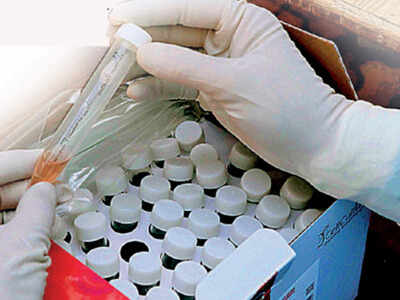
NOIDA: Coronavirus infections continue to rise in the city but the Noida administration has sent its testing strategy behind closed doors. It has not shared data on the number of samples being tested for the last 25 days.
If testing numbers are an indication of the strategy being followed to contain the threat of the pandemic, Noida’s June 11 data that TOI sourced is telling. Between May 18, when testing data was last officially shared and June 11, 3,914 samples were collected in the city. Neighbouring Ghaziabad, in the same period, tested 7,219 samples.
However, Noida’s Covid-19 case numbers have consistently been much higher than Ghaziabad’s and remain so – as of now, Noida’s overall Covid-19 cases stand at 830 and Ghaziabad’s at 581.
The Noida numbers are baffling because one of the key focus areas identified by the city’s Covid response team in April, besides isolation of patients and diligent contact tracing, was substantial testing. The state government, too, has repeatedly emphasised the importance of more testing to identify patients and contain the global pandemic.
In contrast, testing has not only picked up in Ghaziabad, there is data transparency as well. Mohita Sharma, general secretary of the Indian Medical Association (IMA), Noida, said, “Instead of ramping up testing in the district, authorities have been going back and forth over rules and guidelines that have to be followed by private laboratories. As a result, many people who have approached labs for tests have been turned away over the past three weeks. Augmenting testing capacity is required in order to identify active carriers.”
The Noida administration has served notices to several private laboratories over false positive reports, delay in intimation to surveillance teams and inconsistent reporting to the chief medical officer.
District magistrate Suhas LY said, “We have come up with a new strategy to increase testing. Seven new government-run collection centres were added on Friday. The Covid helpline (18004192211) has been ramped up to note down details of people who have symptoms and schedule their test in consultation with the health department. We are confident our numbers will go up again soon.”
The seven centres are the District Hospital (new building) in Sector 39 and old campus in Sector 30, the Bisrakh community hospital, the community health centres at Dadri and Bhangel, and the primary health centres at Dankaur and Jewar.
If testing numbers are an indication of the strategy being followed to contain the threat of the pandemic, Noida’s June 11 data that TOI sourced is telling. Between May 18, when testing data was last officially shared and June 11, 3,914 samples were collected in the city. Neighbouring Ghaziabad, in the same period, tested 7,219 samples.
However, Noida’s Covid-19 case numbers have consistently been much higher than Ghaziabad’s and remain so – as of now, Noida’s overall Covid-19 cases stand at 830 and Ghaziabad’s at 581.
The Noida numbers are baffling because one of the key focus areas identified by the city’s Covid response team in April, besides isolation of patients and diligent contact tracing, was substantial testing. The state government, too, has repeatedly emphasised the importance of more testing to identify patients and contain the global pandemic.
In contrast, testing has not only picked up in Ghaziabad, there is data transparency as well. Mohita Sharma, general secretary of the Indian Medical Association (IMA), Noida, said, “Instead of ramping up testing in the district, authorities have been going back and forth over rules and guidelines that have to be followed by private laboratories. As a result, many people who have approached labs for tests have been turned away over the past three weeks. Augmenting testing capacity is required in order to identify active carriers.”
The Noida administration has served notices to several private laboratories over false positive reports, delay in intimation to surveillance teams and inconsistent reporting to the chief medical officer.
District magistrate Suhas LY said, “We have come up with a new strategy to increase testing. Seven new government-run collection centres were added on Friday. The Covid helpline (18004192211) has been ramped up to note down details of people who have symptoms and schedule their test in consultation with the health department. We are confident our numbers will go up again soon.”
The seven centres are the District Hospital (new building) in Sector 39 and old campus in Sector 30, the Bisrakh community hospital, the community health centres at Dadri and Bhangel, and the primary health centres at Dankaur and Jewar.

Coronavirus outbreak
Trending Topics
LATEST VIDEOS
City
 Doctor taking swab test on self in Lucknow, video goes viral
Doctor taking swab test on self in Lucknow, video goes viral  Actor’s mother tests positive for Covid-19, seeks help from Delhi CM Arvind Kejriwal
Actor’s mother tests positive for Covid-19, seeks help from Delhi CM Arvind Kejriwal  No social distancing, no masks! Lockdown norms mocked in Mumbai wedding procession
No social distancing, no masks! Lockdown norms mocked in Mumbai wedding procession  Two businessmen held in Mumbai for smuggling foreign brand cigarettes worth Rs 12 crore
Two businessmen held in Mumbai for smuggling foreign brand cigarettes worth Rs 12 crore
More from TOI
Navbharat Times
Featured Today in Travel
Quick Links
Kerala Coronavirus Helpline NumberHaryana Coronavirus Helpline NumberUP Coronavirus Helpline NumberBareilly NewsBhopal NewsCoronavirus in DelhiCoronavirus in HyderabadCoronavirus in IndiaCoronavirus symptomsCoronavirusRajasthan Coronavirus Helpline NumberAditya ThackerayShiv SenaFire in MumbaiAP Coronavirus Helpline NumberArvind KejriwalJammu Kashmir Coronavirus Helpline NumberSrinagar encounter
Get the app



